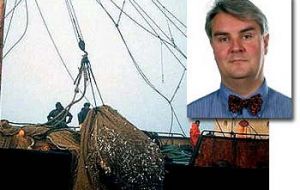MercoPress. South Atlantic News Agency
Corruption in fishing industry rampant, study says
 Carl Gustaf Lundin, head of IUCN marine programme, says 'the large-scale occurrence of corruption adds insult to injury'. (Photo FIS)
Carl Gustaf Lundin, head of IUCN marine programme, says 'the large-scale occurrence of corruption adds insult to injury'. (Photo FIS) Rising demand and diminishing fish stocks are leading to increasing corruption in the fishing industry, a recent study by the International Union for the Conservation of Nature (IUCN) declares.
Compounding the problem, corruption adds to the decline of fish stocks, say experts from IUCN, also known as the World Conservation Union. "The large-scale occurrence of corruption adds insult to injury," said Carl Gustaf Lundin, head of the organisation's marine programme. "The world's global fish stocks are already severely depleted and this is just making the situation worse." Illegal fishing is widespread, the study said. About a fifth of global fish landings are illegal, and the illegal catch worldwide is estimated to be between GBP 1 and GBP 4.5 billion a year (EUR 1.4 - EUR 6.1 billion). The IUCN estimates illegal fishing to account for 16 million tonnes of seafood in 2002, reports The Telegraph. Illegal fishing practices by fishermen include exceeding quotas, mislabelling catches to avoid regulations, smuggling illegally caught fish by hiding them under legitimate catches, and using juvenile fish as bait instead of releasing them. The study said the number of fishing vessels sailing under flags of convenience has increased dramatically since the 1990s. Flags of convenience, issued by country, allow fishing vessels to avoid taxes and pay low wages, and are often a convenient cover for illegal activities. The corruption is not just at the level of the individual fisherman, but ranges up through middlemen to the level of national governments. IUCN research has uncovered incidents of officials taking bribes and deliberately mislabelling seafood products. Corruption was found in the international arena as well. For example, deals negotiated to give the European Union (EU) access to West African waters lacked transparency. According to the study, corruption sabotages the scientific monitoring of fisheries, in that official catch estimates are often lower than the real figures. Consequently, the quotas set by fisheries based on these figures are likely too high to be sustainable, leading to further decline in fish stocks. To cut rampant corruption, the IUCN calls for better enforcement of laws, better tracing and labelling of fish, and satellite tracking of fishing vessels. (FIS)




Top Comments
Disclaimer & comment rulesCommenting for this story is now closed.
If you have a Facebook account, become a fan and comment on our Facebook Page!